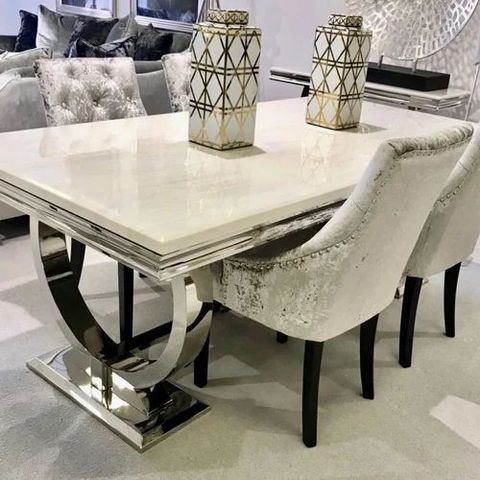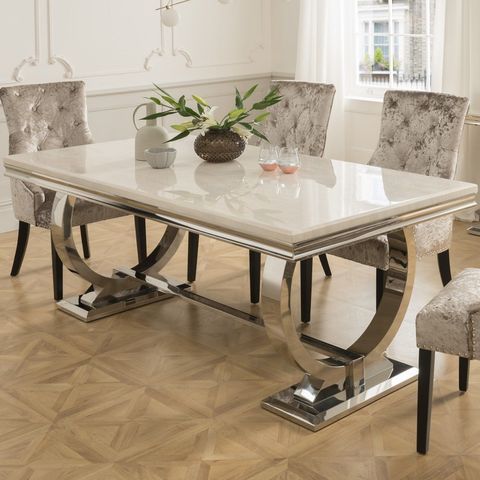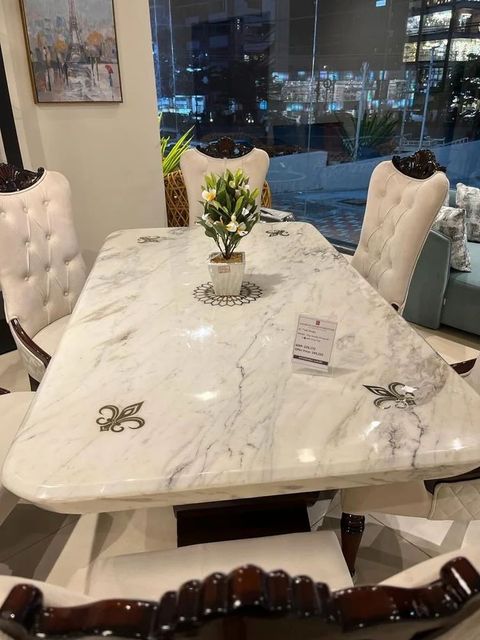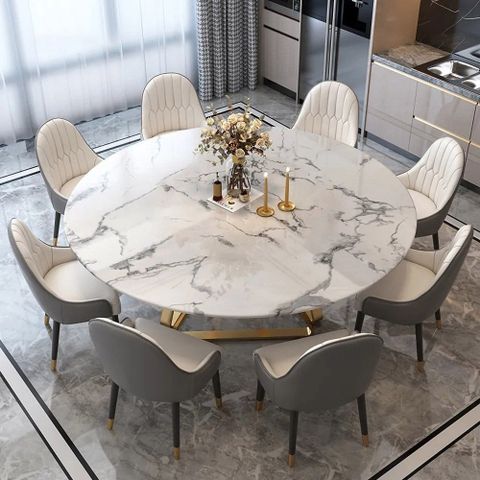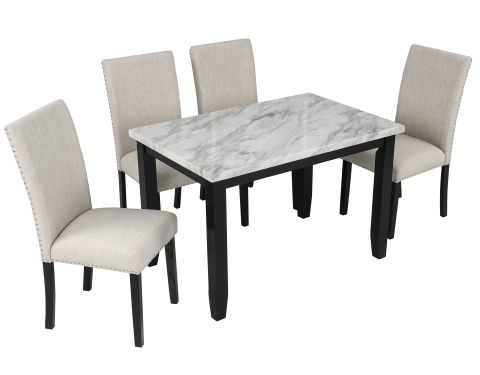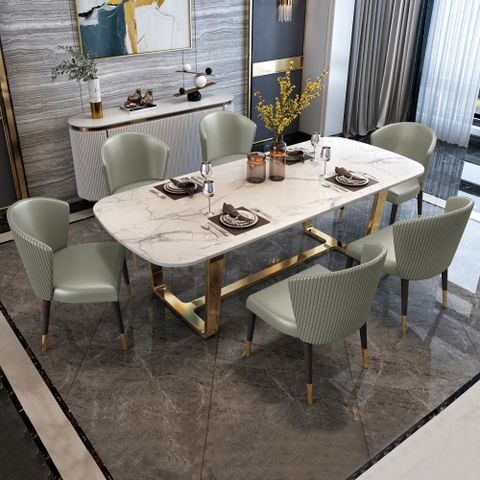There’s something timeless about a marble dining table that makes every meal feel special. But these elegant surfaces require care that goes beyond simple cleaning. The secret lies in understanding how to properly maintain marble, especially when it’s part of a complete dining set. Whether you’ve just inherited your grandmother’s precious marble table or you’re setting up your new home with a stunning marble centerpiece, this guide will show you exactly how to keep these surfaces looking their best.
Marble isn’t just another surface material. It’s a natural stone that carries history and character with every veining and flaw. When you have marble dining tables and chairs in your home, you’re not just owning furniture – you’re owning a piece of geological art. These surfaces tell stories, they age gracefully, and they become more beautiful with time. But they also need attention, and not just any kind of attention. Proper maintenance means the difference between a stunning centerpiece that lasts generations and a surface that loses its luster too soon. Let’s explore what it takes to truly care for these magnificent pieces.
Understanding Marble’s Unique Nature
Marble is a metamorphic rock formed under intense heat and pressure deep within the earth. This process creates unique patterns and veins that make each piece distinct. However, this same formation gives marble some characteristics that make it different from other materials. It’s naturally porous, which means it can absorb liquids and stains easily. The surface is also relatively soft compared to other stones, making it susceptible to scratches and etching.
Think about it this way – your marble surface is like a sponge that’s been carved into beautiful shapes. It can hold onto things, and those things might change its appearance. That’s why understanding how marble works is the first step toward keeping it looking amazing. Unlike granite or quartz, marble requires a gentler touch because of its composition. You can’t just throw any cleaner on it and expect it to stay pristine. It needs specific care that respects its natural properties.
Daily Cleaning Rituals That Work
Keeping your marble surfaces clean daily is essential, but it’s not as simple as wiping down any old surface. The right approach makes all the difference.
• Use a soft cloth or microfiber towel for daily dusting
• Clean with mild soap and water, never harsh chemicals
• Always dry immediately after cleaning to prevent water spots
• Never use acidic cleaners like vinegar or lemon juice
• Avoid abrasive sponges or scrubbers
A common mistake people make is using the same cleaning routine they’d use for wood or metal surfaces. But marble is delicate. Think of it like caring for a fine silk dress – you wouldn’t wash it with bleach, right? Similarly, you shouldn’t use strong chemicals on marble. A gentle approach works better and preserves the surface’s natural shine.
Consider having a small bucket nearby during meals. If you spill something, clean it up quickly. This prevents stains from setting in, especially with acidic substances like wine or citrus juices. Quick action is often the best medicine when it comes to marble care.
Dealing with Stains and Spills
Stains are the biggest enemy of marble surfaces. They happen faster than you might think, especially with common household items. Here’s what to do when things go wrong:
• Act fast – the sooner you address a stain, the better your chances of removal
• Blot spills immediately with a clean cloth
• For oil-based stains, sprinkle cornstarch or talcum powder to absorb the liquid
• For water marks, gently dry the area and apply a small amount of mineral oil
• Test any cleaning solution on a hidden area first
Water stains are particularly tricky because they can leave permanent marks if not addressed properly. Some people try to use regular household cleaners, but these often contain acids that can damage the marble’s surface. Instead, focus on prevention and immediate response. Keep a small bottle of mild soap and water handy near your dining area.
Real-world example: A family once had a wine stain on their marble table that looked like it would ruin everything. They acted quickly, blotted the spill, then applied a paste made of baking soda and water. After letting it sit for a few minutes and gently scrubbing, the stain disappeared completely. The key was acting fast and using the right technique.
Protective Measures and Usage Tips
Prevention is always better than cure, especially with marble. Here’s how to protect your investment:
• Use coasters and placemats for drinks and food
• Place felt pads under chair legs to prevent scratches
• Avoid placing hot dishes directly on the surface
• Use trivets for hot pans and cookware
• Never slide heavy objects across the surface
• Consider using a tablecloth or runner for extra protection
One of the most important practices is being mindful of what you put on your marble surfaces. Hot pots can cause thermal shock, leading to cracks or discoloration. Heavy objects dragged across the surface can scratch the finish. Even seemingly harmless items like keys or coins can leave marks if they’re dropped or dragged.
Think of your marble table as a guest in a fancy restaurant. You wouldn’t want to put your muddy boots on the floor, would you? Treat your marble surface with the same respect. Invest in quality coasters, placemats, and protective accessories. These small expenses pay off in the long run by preventing costly repairs or replacements.
Professional Care and Restoration
Sometimes, despite your best efforts, marble surfaces need professional attention. This is normal and expected, especially for high-end pieces. Signs that your marble needs professional help include:
• Deep scratches or chips that can’t be buffed out
• Severe staining that won’t lift with regular cleaning
• Loss of polish or dullness that persists after cleaning
• Cracks or fissures in the surface
• Deep etching from acidic substances
Professional restoration can bring back the original beauty of your marble. This typically involves:
• Surface polishing to remove minor scratches
• Sealer application to protect against future damage
• Repair work for chips or cracks
• Deep cleaning to remove embedded stains
Many homeowners think they can handle major issues themselves, but marble restoration is an art form that requires specialized tools and knowledge. A skilled technician can often restore a damaged surface better than DIY attempts. It’s worth noting that some marble types are more prone to damage than others, so understanding your specific type helps determine when professional help is needed.
Long-Term Maintenance Schedule
Creating a maintenance routine helps ensure your marble stays beautiful over time. Here’s a suggested schedule:
Monthly tasks:
• Light cleaning with appropriate products
• Check for any signs of damage or wear
• Reapply sealer if recommended by manufacturer
Quarterly tasks:
• Deep cleaning with specialized marble cleaners
• Inspect chair legs and table bases for wear
• Check that all protective measures are still effective
Annual tasks:
• Professional inspection and light restoration
• Evaluate if additional protective treatments are needed
• Consider resealing if the surface looks dull
Some people prefer to do everything quarterly, while others stick to monthly basics. The key is consistency. Even if you’re not doing extensive work, regular attention keeps marble looking fresh. It’s like taking care of a favorite pair of shoes – you don’t need to polish them every day, but you do need to clean them regularly.
Remember that marble gets used, and that’s perfectly normal. The goal isn’t to make it look brand new all the time, but rather to preserve its natural beauty and longevity. Your marble table will appreciate the attention, and it will continue to be a centerpiece that brings joy to your home for many years.
Taking care of marble dining tables and chairs is both an art and a science. It requires understanding the material’s unique properties, implementing proper cleaning techniques, and knowing when to seek professional help. The rewards are worth the effort – you’ll have surfaces that not only look stunning but also last for generations. Think of marble as a living piece of art that changes with time but maintains its essential beauty. With the right care, your dining room will remain a place where memories are made, not where surfaces get damaged. The investment you make in proper maintenance today pays dividends in the form of lasting beauty and functionality. Every gentle wipe, every careful cleaning, and every thoughtful protection measure contributes to keeping these remarkable surfaces in their prime condition for years to come.


